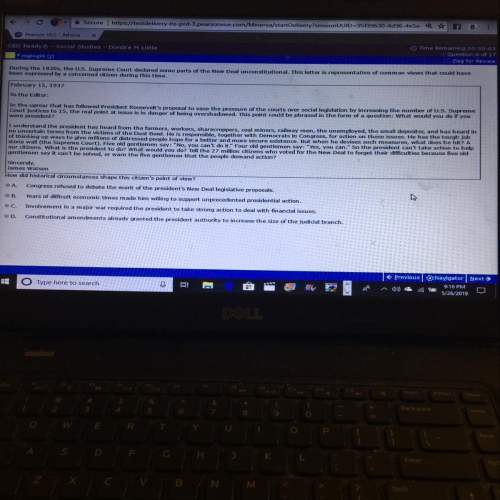
History, 05.10.2019 18:40 ljcervantes4824
Why were some delegates opposed to having a president to lead the executive branch?

Answers: 1


Another question on History

History, 21.06.2019 19:10
Historians are concerned with the accuracy of their writings and readings but are also aware of the inability of authors to know every angle of every story biases, perspectives, beliefs, and a variety of other differences history being told by one person at a time no one being totally accurate, as hard as we try really need on this, and you^^
Answers: 2

History, 21.06.2019 22:30
Which best describes how president kennedy apples to the audiences at the beginning of his speech?
Answers: 1

History, 22.06.2019 00:40
Which is one reason many african nations have not prospered after gaining independence from european colonial powers? a. colonial powers sent their weakest economic advisors to the new countries, and their recommendations were flawed. b. independence left them with weak economies, and many countries have been unable to overcome or recover from these burdens. c. the desert region of the interior is inhospitable to foreign investors, and business interests focused on the coastal mediterranean cities. d. the money endowed upon independence is still tied up in the bank of england, which is hesitant to make loans to struggling nations.
Answers: 1

History, 22.06.2019 01:30
Which of these is a role of congress? a) to veto legislation b) to pass the federal budget c) to nominate cabinet members d) to interpret the constitution 2) which of these is a power of the legislative branch? a) declare war b) enforces laws c) interprets laws d) negotiates treaties 3) a two/thirds vote of each house of congress is required to a) impeach the u.s. president. b) approve presidential appointments. c) pass an appropriation or tax bill. d) pass a bill over the president's veto. 4) the chief purpose of congressional committees is to a) draft legislation for consideration by the full congress. b) act as a group to which the president can direct his lobbying effort. c) provide a place for lobbyists and special interest groups to get support. d) hold hearings so that bills can be evaluated and studied prior to voting. 5) after a bill has been passed by both houses of congress it a) becomes a law. b) is sent to the president. c) returns to the house of origin for verification. d) is sent to a subcommittee in the house or senate. 6) house of representatives passes a spending bill → senate debates the spending bill → senate passes the spending bill → ? what completes this sequence of events? a) the spending bill becomes a law b) the states must approve the bill c) the supreme court reviews the bill d) the president must act on the bill eliminate
Answers: 1
You know the right answer?
Why were some delegates opposed to having a president to lead the executive branch?...
Questions

Biology, 22.04.2020 15:00


English, 22.04.2020 15:00

Mathematics, 22.04.2020 15:01


Biology, 22.04.2020 15:02

Business, 22.04.2020 15:02

Law, 22.04.2020 15:02

Mathematics, 22.04.2020 15:02

Mathematics, 22.04.2020 15:03



Mathematics, 22.04.2020 15:03

Chemistry, 22.04.2020 15:04


History, 22.04.2020 15:04




Geography, 22.04.2020 15:04




